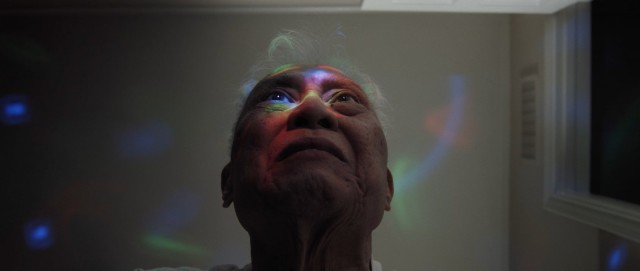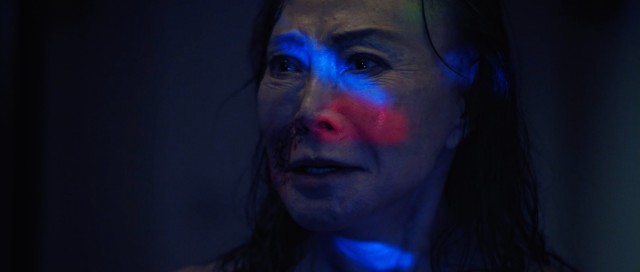Alums Nick Hartanto and Sam Roden (The Dishwasher) are back on Short of the Week with an emotionally charged and deeply personal genre drama of nightmarish realism. Internationally premiering at Fantasia, Atrophy swept through the genre fest circuit alongside films with a much more classic approach to horror – which it is anything but. Carving out its own lane, the film is a psychological terror born from the fear of experiencing atrophy, the film’s very namesake. Starring Irene Tsu, who gives a powerhouse performance alongside Bert Matias, it’s no wonder why it has snagged so many Best Performance awards throughout its festival run. An introspective and often weirdly absurd exploration of coping and caregiving, Atrophy will deeply move you.
“I knew deep down that I wanted to tell their story, if for no other reason than to process my own emotions”
When it comes to horror, blood and guts are probably the first things to come to mind, yet Atrophy presents an altogether different kind of fear to keep you up at night: losing control of your body. In truly harrowing circumstances, a stroke victim finds herself descending into a waking nightmare as her husband struggles to become her caregiver after finding an old karaoke machine in the garage. “Atrophy is about my parents,” Hartanto explains, “my mother suffered a massive stroke that left her half-paralyzed and unable to speak. The trauma of that event weighed heavily on both my parents, as their lives were forever changed.” Drawing from such a personal experience for its narrative is what makes Atrophy so authentic and that much more gut-wrenching. “I knew deep down that I wanted to tell their story, if for no other reason than to process my own emotions, but it was quite a struggle to come up with an idea that didn’t simply feel bleak and hopeless,” Hartanto reveals.
Using genre as a framework, Hartanto and Roden put us in the headspace of both characters as their whole world turns upside down to the tune of strange karaoke. The surreal and bizarre distraction is the crux of the dual story arc between both characters and it’s, quite frankly, hypnotic. “One night, I witnessed my father asleep in a dark room in front of a glowing karaoke machine blasting nostalgic Indonesian music while a woman sang to him like a siren from the screen. It was a magical sight that unlocked a realization that I could use genre elements to show the horrors of my mother’s fight to recover from the stroke and my father’s struggle to become her caregiver,” Hartanto reveals. But it wasn’t an easy sell for his creative partner, Roden, who admittedly isn’t the biggest fan of horror.

Bert Matias bathed in the hypnotic lights of the mystical karaoke machine
“Tone was another challenge — Nick has been a fan of horror since childhood, I have not”, Roden confesses. “It’s not that I didn’t want to be, I love most genres and could certainly appreciate the visceral nature of horror, it’s just that I was always so affected by movies that horror overwhelmed me”. As a filmmaking duo, they co-produce, co-write, and co-direct and had to find a balance in which they could use genre elements, like surrealism, to create tension and playfulness, while also grounding the story in such a way that it didn’t lose sight of the characters’ internal struggles. While much of the story developed in the edit, in which Roden took the lead, the cinematography by Hartanto was inspired by yet another personal experience.
“After my mother returned from the hospital, my father had me install nanny cameras in each of their rooms in case he ever had to leave her home alone. As a filmmaker, I found myself obsessively checking on these cameras and being deeply moved by what I saw – ultra wide-angle shots, quiet, gritty and unflinching,” Hartanto tells Short of the Week, “I do think the images and moments in their lives that I witnessed through the security cameras found their way into the cinematography through the use of wide-angle long takes. There was also just a sense of foreboding and darkness inherent in security camera footage that really helped me to see how genre could be incorporated into the scenes we wrote as well.”

Irene Tsu’s career dates back to 1961, but Atrophy might be her most revealing performance so far.
Casting posed a big challenge for Hartanto and Roden as they were tasked with finding their leads – two actors from Southeast Asia in their 70s who were willing, let alone capable, of doing very intense physical acting. After quite the search, they settled on Irene Tsu and Bert Matias who absolutely knocked it out of the park. In particular, Tsu’s performance will leave your heart in your throat and subconsciously flexing all of your limbs. Playing the part of a woman who suffered a stroke, losing both muscle control in her legs and the ability to speak, Tsu had to dig deep to convey a complex character with layers of emotional conflict. Her acting feels so genuine that it’s easy to believe she really is paralyzed to some degree.
According to Hartanto and Roden, both actors brought an incredible work ethic and sense of humor to the challenging material presented in the script and were very collaborative. Furthermore, having participated on the jury of Northbend Film Fest and Brooklyn Horror, I can attest first-hand how much the acting in Atrophy moved us all – enough for awards in performances at both genre fests!
“After all the horror and despair we are left with a feeling of vulnerability and hope”
Hartanto’s main goal for this project was to give a voice to those struggling with atrophy. “After the stroke, I spent time with my mother and her therapists and they taught me the importance of making sure she felt seen and heard,” Hartanto reveals, “In our opening shot, we see her struggle to just get out of bed while her husband sleeps, where she succeeds when no one is watching, except the camera, which sees everything including this woman who is not gone – who is still here; that after all the horror and despair we are left with a feeling of vulnerability and hope.”
Atrophy was an official selection at the Fantasia International Film Festival, North Bend Film Festival with a Best Actress award for Irene Tsu, Beyond Fest, Nightstream and the Revolution Me Film Festival with a win for Best Short, Best Actress and Best Social Awareness Award. As for what’s next for Hartanto and Roden, they are working on an independently produced pilot called Honeycomb.

 Chelsea Lupkin
Chelsea Lupkin